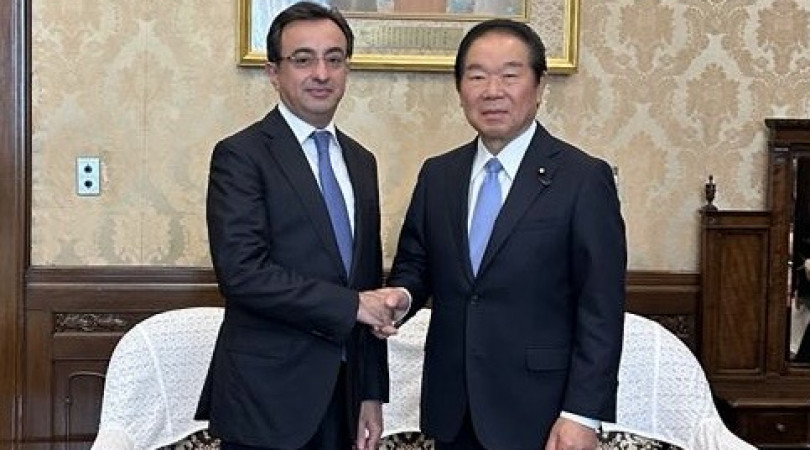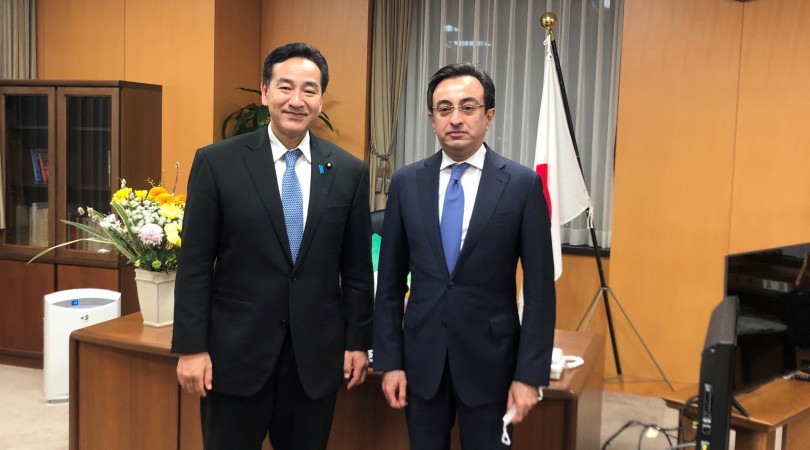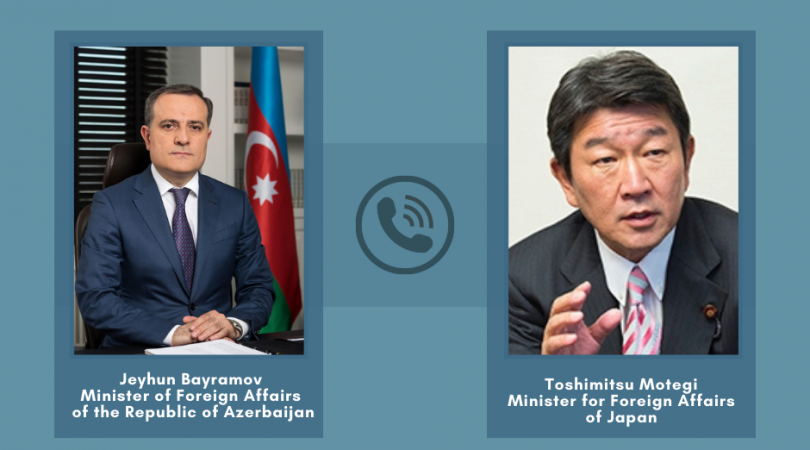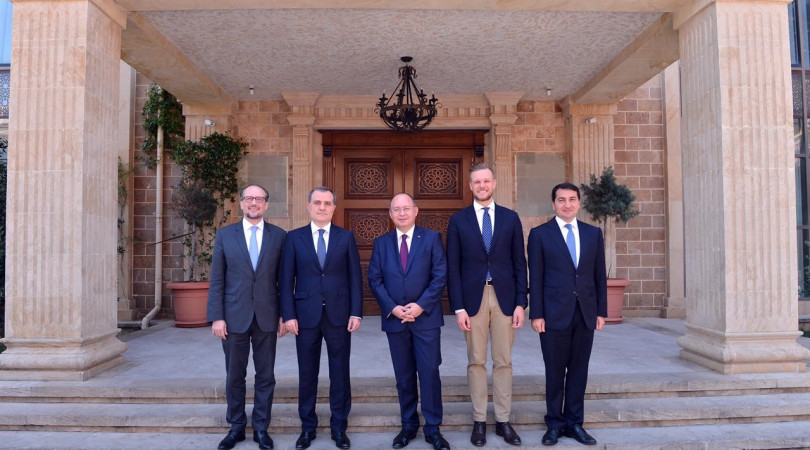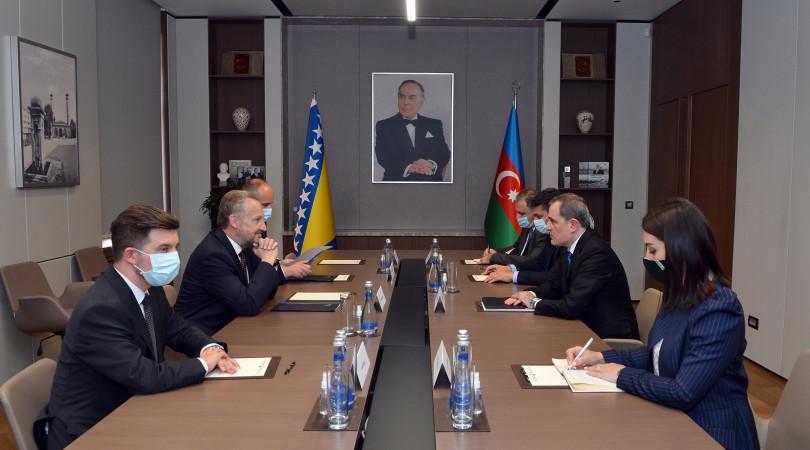Ramsar Statement of the Fourth Trilateral Meeting of the Ministers of Foreign Affairs of the Islamic Republic of Iran, the Republic of Azerbaijan and the Republic of Turkey
Ramsar Statement
Fourth Trilateral Meeting of the Ministers of Foreign Affairs of the Islamic Republic of Iran, the Republic of Azerbaijan and the Republic of Turkey
At the Invitation of H.E. Mr. Mohammad Javad Zarif, Minister of Foreign Affairs of the Islamic Republic of Iran, and with Participation of H.E. Mr. Elmar Mammadyarov, Minister of Foreign Affairs of the Republic of Azerbaijan and H.E. Mr. Mevlut Cavusoglu, Minister of Foreign Affairs of the Republic of Turkey, the Fourth Trilateral Meeting of the Ministers of Foreign Affairs was held on 5 April 2016 in Ramsar, Islamic Republic of Iran.
The Ministers,
- Emphasized their commitment to the Urumieh, Nakhchivan and Van Statements adopted in the previous Trilateral Meetings of the Ministers of Foreign Affairs;
- Convinced that the deep-rooted historical, religious and cultural commonalities and common values existing among the peoples of the three countries have provided unique opportunities and possibilities for further solidarity;
- Underlined the firm determination of the three parties to explore new ways to expand cooperation particularly in the areas that would ensure prosperity for the people of the three countries through economic growth and sustainable development;
- Confirmed their commitment to establish a belt of peace, stability, security, prosperity and cooperation in the region by further enhancing their relations in all fields and underlined that these endeavors will strengthen the sense of regional ownership through solidarity;
- Emphasized their common interest to strengthen peace and stability in the region and stressed in this context their commitment to principles of international law, including in particular, respect for sovereignty, territorial integrity, inviolability of internationally recognized borders and peaceful settlement of all disputes;
- Reiterated, in this regard, the importance of the earliest resolution of Armenia–Azerbaijan Nagorno–Karabakh conflict on the basis of the above mentioned principles;
- Agreed to continue close consultations on regional and global issues of significant common interests at different levels and platforms and within the framework of international and regional organizations such as the United Nations, the Organization of Islamic Cooperation, the Conference on Interaction and Confidence Building Measures in Asia, and the Economic Cooperation Organization, with a view to enhancing regional and international peace, security and stability;
- Welcomed the agreement reached between the Islamic Republic of Iran and the P5+1 (including China, France, Germany, Russia, UK and US) and the EU on the Joint Comprehensive Plan of Action (JCPOA) on 14 July 2015, and are of the firm belief that with the removal of sanctions and restrictions, there has been created more suitable grounds than before for the expansion of economic cooperation among the neighboring countries, and commended in this context the Islamic Republic of Iran for its honest and serious implementation of the agreement, as also stated in the latest report of the Director General of IAEA on the agreement, and called on the other JCPOA participants to comply with their commitments genuinely and responsibly;
- Expressed their disappointment at the result of the 2015 NPT Review Conference and confirmed their support for the final document of the 2010 NPT Review Conference which adopted a Plan of Action for the implementation of 1995 Middle East Resolution on the establishment of a zone free of nuclear weapons and other weapons of mass destruction in the Middle East;
- Decided to intensify all efforts to improve their economic and commercial cooperation so as to meet actual potentials to promote investments and trade; and to further strengthen cooperation in the field of energy, transport, telecommunications, industry, education, science, culture, tourism and sports through joint projects and programs;
- Reiterated the importance of the cooperation within the framework of the Economic Cooperation Organization (ECO) and underlined the need to focus on its priority areas of trade, transport, communications and energy and to implement concrete projects in the areas in the interests of all member countries;
- Stressed their determination not to allow their territories to be used by any people or group of individuals, under any circumstances, for any threat and activity in terms of security and stability against each other;
- Reiterated their firm commitment to strengthen their cooperation in the fight against terrorism, and violent extremism and separatism in all their forms and manifestations, transnational organized crime, narcotics, arms and human trafficking and migrant smuggling as well as sectarianism; and welcomed in this context the adoption of the United Nations General Assembly Resolution entitled; “A World Against Violence and Violent Extremism” (A/RES/70/109) on 10 December 2015, initiated by the Islamic Republic of Iran, and called for the full implementation of this Resolution;
- Condemning all forms of intolerance and discrimination based on ethnicity, race, color, religion and belief and emphasizing the importance of nurturing tolerance, respect, dialogue and cooperation among different cultures, civilizations and peoples, the parties confirmed their dedication to the goals and principles of the UN Alliance of Civilizations Initiative, co-sponsored by Turkey and Spain. In this regard, emphasized the significance of the 7th Global Forum of the Alliance to be held in Baku, Azerbaijan on 25–27 April 2016, underlined their readiness to participate actively in the above-mentioned Forum;
- Recognized the significant importance of promoting brotherhood and Islamic unity to confront daunting challenges facing the Islamic World and stressed their willingness to further cooperate actively and effectively in strengthening tolerance, understanding and Islamic fraternity;
- Underlined the importance of the adoption of the Trilateral Sectoral Cooperation Action Plan for 2016–2018 and emphasized the coordinating role of Ministers of Foreign Affairs in its implementation; therefore, encouraged relevant Ministries and Agencies to enhance trilateral cooperation aimed at practical implementation of the provisions of the Action Plan and make efforts towards its further fulfillment;
- Stressed the importance of the follow up of the decisions taken and the Action Plan adopted at the Ministerial level and decided to establish a Steering Committee which will act as a coordinating body of the trilateral mechanism. The Committee will convene at least one month before Ministerial meetings and review the progress in implementing the actions and activities listed in sectoral cooperation action plans and report to the Trilateral Ministerial Meeting. This Steering Committee will be composed of Deputy Ministers of Foreign Affairs at the political level of three countries.
- Reiterated the importance of holding regular meetings in the trilateral format to further their political dialogue, coordination and cooperation on regional and global issues;
- Agreed to hold the next meeting in 2017 in the Republic of Azerbaijan.

